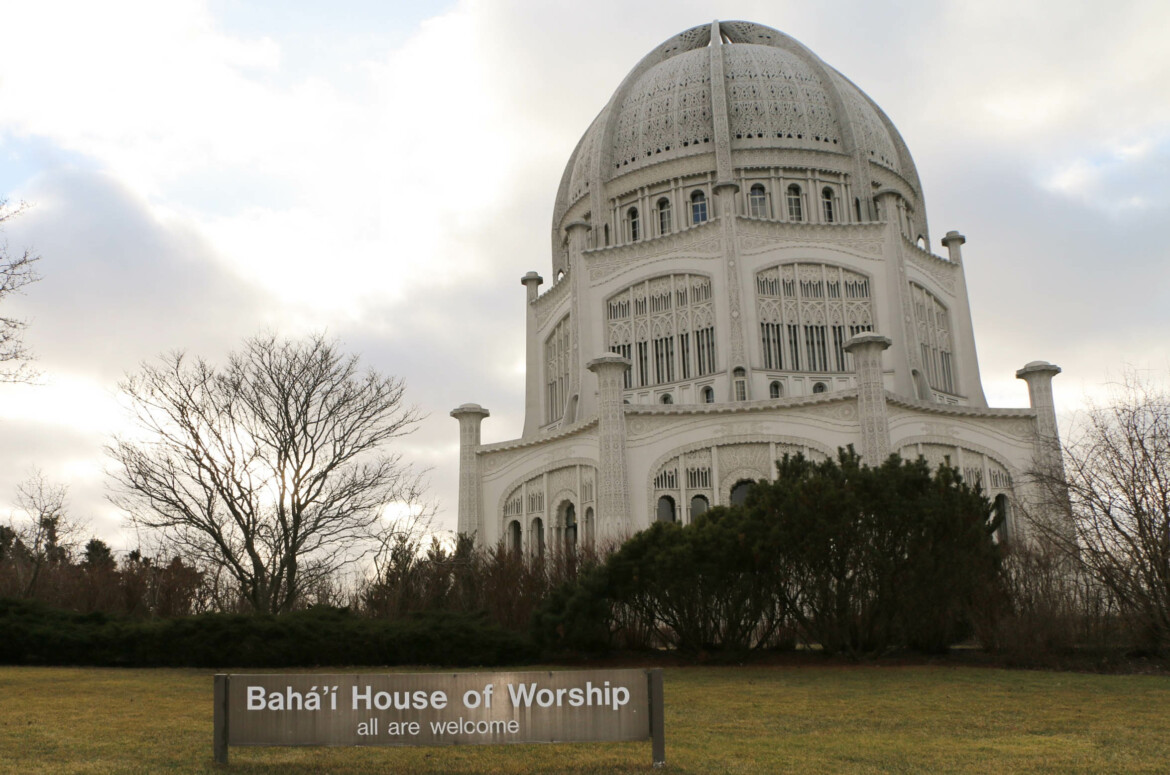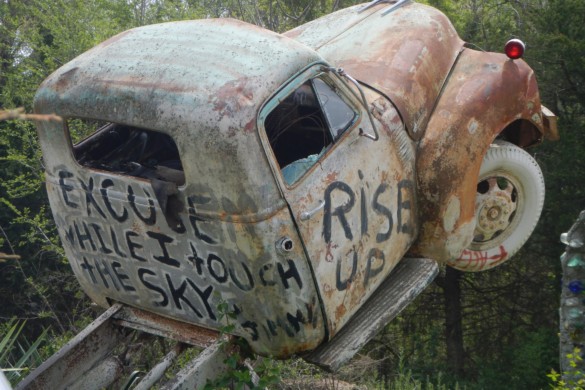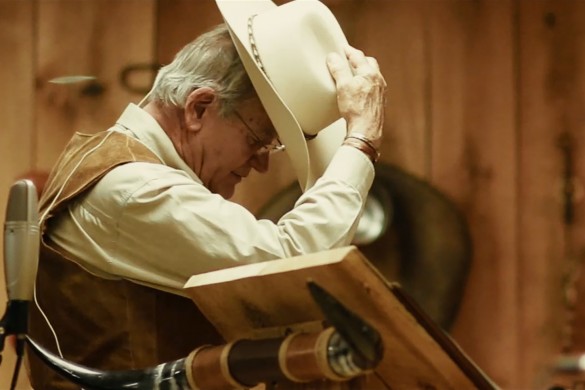The Bahá’í House of Worship in Wilmette, Illinois, is one of only eight in the world. Just like its faith, it’s open to all
Words and Photos by Giuliana LaMantia
The inside of the temple was white, and pillars branched all the way to the top of the dome, crisscrossing into intricate patterns. A woman named Rebecca Rice stepped up to the microphone. She sang a few lines of the word of God. People of many races sat in the plush, blush-colored seats before her. They were silent.
This is the Bahá’í House of Worship in Wilmette, Illinois. It’s one of eight Bahá’í temples in the world, and it’s the only one in North America. It’s open not just to those of the Bahá’í faith, but to people of all religions and cultures. Its people come from all walks of life, and they strive for progression, inclusiveness and a unified world.
Beliefs
The goal of the Bahá’í faith is world unity.
Its founder, Bahá’u’lláh, came from Persia in the middle of the 19th century and was a messenger from God, sent to teach world unity. He said that there was only one God, one people and one religion, and that God had a plan from the beginning.
“Bahá’u’lláh brought teachings to unite humanity,” said Chris Vodden, director of the Bahá’í House of Worship in Wilmette. “He said that the time for nation building is over, the earth is but one country and mankind is its citizens. He says, ‘Let your vision be world embracing, not concerned with your own selves.’ Now is the time for humanity to see each other as one family.”
Each of the world’s major religions – including Judaism, Hinduism, Buddhism, Islam and Christianity – are all “chapters” in a book, according to the Bahá’í. Divine prophets throughout history – such as Abraham, Moses, Krishna, Buddha, Muhammad and Jesus – were sent from God at different stages in the world to teach humanity something new. First, humanity needed to learn about unity of the family. Next, they learned about unity of the tribe, then the city-state, and afterwards, the nation. The Bahá’í faith is the next chapter in the religion and its story of humanity.
One hundred seventy years later, it’s the second most widespread religion, after Christianity.
To represent the progression, the main symbols from different religions are included on the exterior pillars on the House of Worship. This includes the nine-pointed star of the Bahá’í faith. The number ‘9’ is significant. There are nine sides to each temple with a garden and fountain on each side. Since it is the highest single-digit number, it is seen as a symbol of strength, completeness and unity.
Because the main focus is unity, there are not separate branches of the religion. Though some have tried, none have succeeded. There is, and always will be, only one form of the Bahá’í faith.
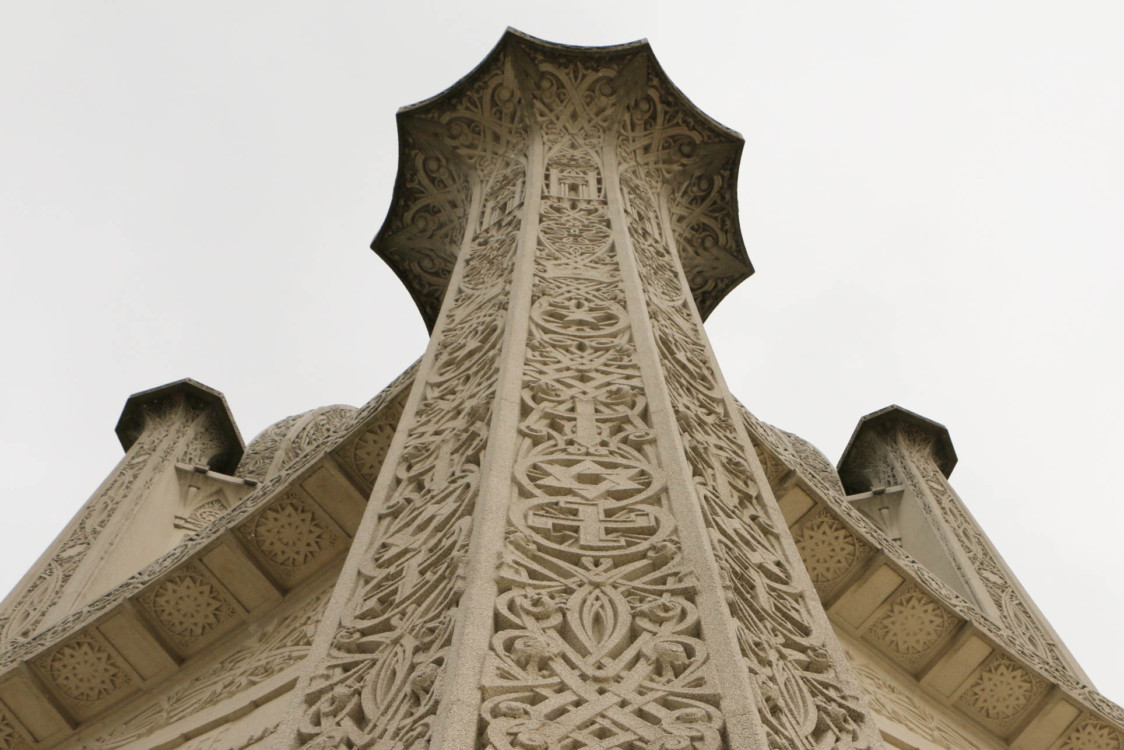
Symbols from different world religions, such as Hinduism, Judaism, and Christianity, are shown on the pillar of the House of Worship.
Religion, Science and Faith
The Bahá’í religion can only accept donations from people who are Bahá’í.
Vodden learned this when he tried to send money to the faith before becoming Bahá’í, only to find out they donated his contribution to charity. After this, he decided to become a Bahá’í.
“I thought this must be it, this is the truth,” Vodden said. “I’ve got a lot to learn, but I think this is the path I want to go on.”
He hadn’t always been this sure, though.
Vodden is originally from Hull, England. He was born into a Christian family; his grandfather was a Bishop in the Anglican Church. When he was 5 years old, his father took a job in India on the British Council, and they moved. During his time India, Vodden was exposed to all major religions and some lesser-known ones. Even so, he didn’t understand it. He viewed religion as superstitious and dogmatic. By the time he was a teenager, Vodden decided he did not believe in God and became an atheist.
But during his college years at Hull University, he had a realization.
“I studied evolution and pre-history, and I found it fascinating,” Vodden said. “I learned about the evolution of humanity, life, geology, the Ice Ages, and I saw the beauty of the universe, the infinity and time and place, and I thought, ‘How can all this order exist in the world, in the universe? How can you get this from absolute nothingness?’ And I thought, ‘there has to be a creator.’”
While at school, Vodden met a Bahá’í couple. At the time, he wasn’t ready to investigate religion. It wasn’t until after his time at the university that he began questioning. He wanted to find a community that aligned with his beliefs. Curious about the Bahá’í faith, he wrote to the Bahá’ís of Hull. As it turned out, the wife of the couple from school was the secretary. She sent him information to read. Vodden went from studying the material to attending informal meetings where he interacted with Bahá’ís and learned about the faith.
“I became closer to these ideals of world citizenship, people working together,” Vodden said. “This is what the Bahá’í faith believed in, and the organization spread throughout the whole world. But I was still hesitant to take that step.”
That’s when he decided to donate money, and the rest is history.
There aren’t many rituals in the Bahá’í religion. In fact, there isn’t even one to accept the faith as one’s own.
“When you decide to become a Bahá’í, it’s because you accept Bahá’u’lláh as the messenger, the manifestation, the prophet of this age,” Vodden said. “So you accept him and you know that he has brought laws for humanity. Not only for the protection of yourself, but for the protection of humanity, and that these laws have a scientific reason, they’re not just arbitrary laws.”
For Vodden, the Bahá’í faith explains the mysteries of the faiths preceding it in a logical way. To him, science and religion need to work together. With too much religion comes superstition, and too much science causes materialism.
“I think this idea of humanity working together was a very powerful draw to me,” Vodden said. “Ultimately, we have to have a religion and we have to have the knowledge of God, and it is through spirituality as well as science working together. The ultimate destiny of humanity is a glorious one of coming together.”
A few months after becoming Bahá’í, Vodden was elected to the local spiritual assembly of Hull. The Bahá’í religion does not have a clergy, but rather democratically elected officials at local, national and international levels, that play an administrative role and support Bahá’ís. From there, he moved to Haifa, Israel, where he served at the Bahá’í World Center for 12 years.
He soon met his wife and moved to the suburbs of Chicago. In 2010, he settled into his role as director of the North America House of Worship in Wilmette, where he has been ever since.
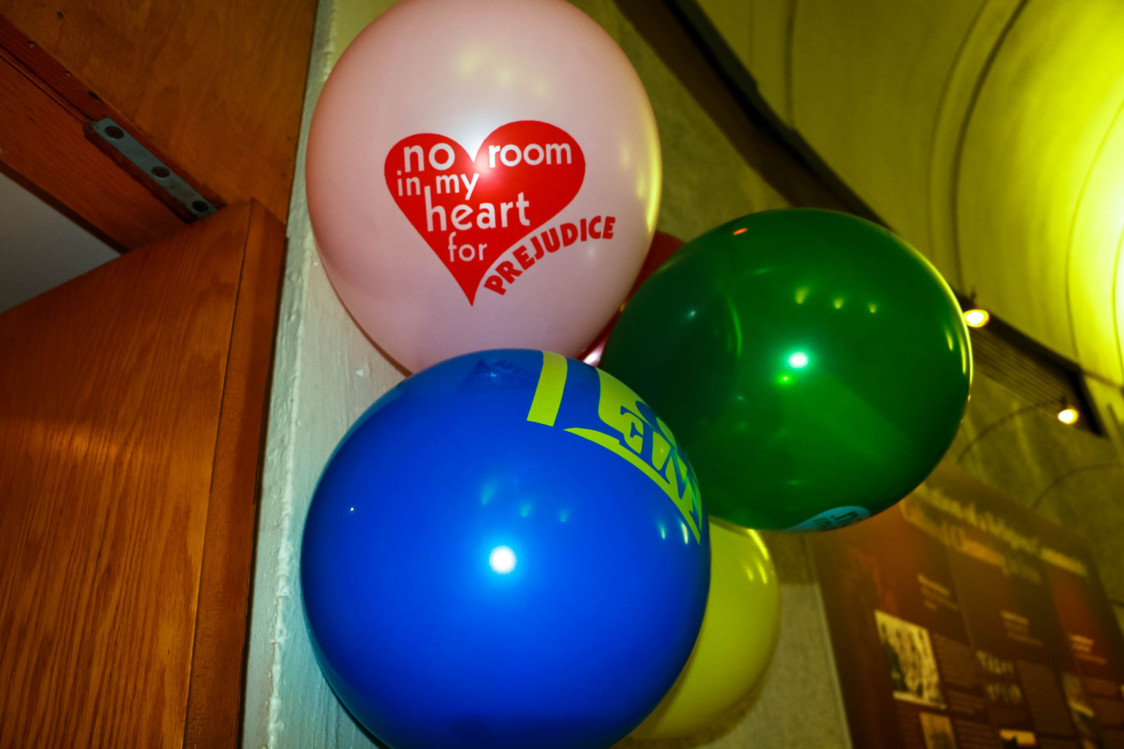
Equality between races, religions and gender is a major part of the Bahá’í faith. They are taught to eliminate prejudice.
Bahá’ís Today
College student Pegah Nabili worships at the Bahá’í House of Worship. She was born into a Bahá’í family, but it didn’t stop her from finding the religion for herself.
According to the Bahá’í faith, at age 15, people become responsible for investigating their faith for themselves and deciding if they are, indeed, Bahá’í. Nabili did this by studying the writings of Bahá’u’lláh. The Bahá’í religion does not yet have a unified book of Bahá’u’lláh’s teachings, but rather separate, shorter books. As a new faith, many of his writings are still being translated from Arabic and Persian.
“I think the most important thing is reading the writings of Bahá’u’lláh,” Nabili said. “We’re, in a sense, lucky, because Bahá’u’lláh’s faith is a new one, so he has a lot of authorized text that he has written on various topics. So by reading them, you’re able to match it with your reason, like, ‘does this make sense to me?’ That was my process.”
Prayer is another important part of the investigation process, and of the religion in general. Prayer is seen as a private and individual act. During Bahá’í services, or devotions, one person will recite a word from God, while those gathered will reflect and speak to God on their own.
Putting prayers and studies into action is also a crucial piece of the investigation. Keemia Soheil and Samir Nooshabadi, both members of the faith born into Bahá’í families, agreed that serving the community played a big role while they explored their faith at age 15, and it continues to impact them now.
“There has to be some sort of outward expression to your transformation,” Nooshabadi said. “So just being a passive worshipper isn’t acceptable. You have to be doing something outwardly as well. Service is that arena where your passive worship becomes active, but you need both.”
It’s especially important to Bahá’ís to not only get to know the people around them, but to make the community a better place together.
“I think right now regardless of your political affiliation or religion, it’s a very dis-unified moment in history where there’s a lot of chaos and disorganization in terms of on a social level, but also on a spiritual level,” Soheil said. “How do we express not only our dissatisfaction with the current state of affairs, but also combat these forces of darkness that have slowly enveloped our nation?”
Soheil works with a program near her college to help students ages 11 to 14 realize their spiritual capacity and how they can become agents of change. Right now, she is helping them organize an interfaith event at their school.
Besides this program, Bahá’ís have created numerous other interfaith organizations and programs throughout the world to foster a dialogue between people of different faiths and determine how they can work together to serve.
“I feel like me giving my time to something like that is a way that I confront these forces like the prejudice,” Soheil said. “It’s helping people realize a sense of unity in the community and not just being angry about it.”
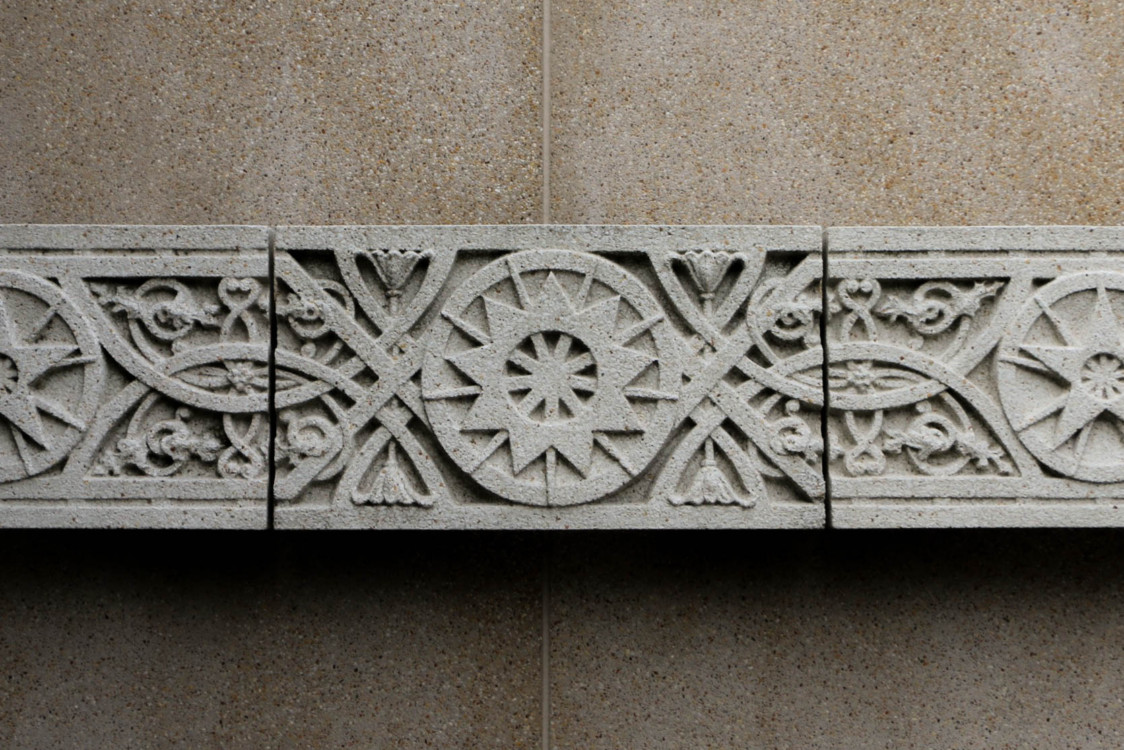
The 9-pointed star is a symbol of the Bahá’í faith. It can be found on and around the temple and welcome center.
Sharing the Story
Rebecca Rice writes the programs for devotions at the Wilmette House of Worship. Sometimes, excerpts from the Bible and the Quran are included. Rice explained that this is because they are seen as the sacred word of God.
“When you embrace Bahá’u’lláh and the Bahá’í faith, you’re embracing that reality of all those previous messengers,” Rice said. “In fact, Bahá’u’lláh says if you turn against any of them before him, you’ve turned against God, because all of those profits are of the same Holy Spirit.”
Rice is the Welcome Center Coordinator at the House of Worship. She organizes events and programs at the temple and focuses on community outreach. She’s the only person in her family of birth who is a Bahá’í.
Rice was raised Methodist. Despite her strong upbringing in faith, the message never resonated with her. During her second semester at Illinois State University in Normal, Illinois, she met a Bahá’í who shared his faith with her. At age 18, Rice became Bahá’í. One year later, she married the man who taught her the faith. They raised their children Bahá’í, and their grandchildren are involved in the religion too. She’s been a Bahá’í for more than 40 years.
“Growing up, I’d often wondered about these other religions and seemingly divine educators that my faith didn’t talk about, other than maybe Abraham and Moses, because they seemed to me to be of God,” Rice said. “This faith made sense of that for me.”
Becoming Bahá’í was easy for Rice. Communicating with her family was the hard part. Her father thought that she was going through a phase. Her mother was more understanding, although she did not agree with it herself.
“It took me a while to feel comfortable in family settings for fear they would say something, but then I realized, ‘what does it matter what they say?’” Rice said. “Even if they ask me a question I don’t know the answer to, I’ll tell them I’ll look it up and find out. I think I had to mature a little.”
Rice’s family has chosen not to engage in conversation about religion or spirituality with her. She wishes that they could have a more open dialogue and understanding about their different beliefs. She sees her faith as a gift to not only herself, but to humanity, and tries to share it with others when it seems appropriate in conversation.
“I figure if much of humanity is following some faith and knows that god is going to speak again, who am I to not tell people,” Rice said. “Bahá’u’lláh says we can’t force people to believe, and we shouldn’t proselytize, but we can share the faith, definitely.”
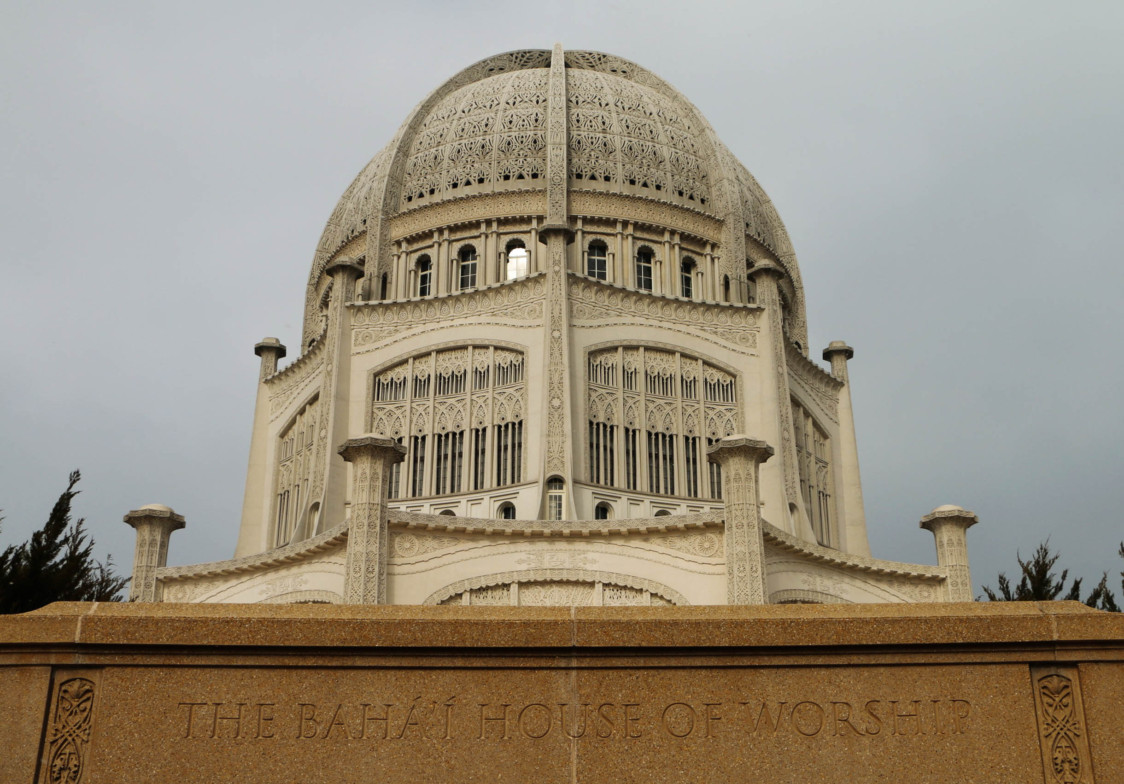
The Bahá’í House of Worship in Wilmette, Illinois is seen as a gift to both the Bahá’ís and non-Bahá’ís of North America. It is their home to worship, reflect or meditate.
Progression
The Bahá’í faith is about working together to move forward.
Humanity moves onward. Vodden says humanity is in a state of adolescence. In a time of disruption and rebelliousness, humankind is on the cusp of a golden age. Some may still be tied to tradition, but others sense the need to advance.
“You can see it now,” Vodden said. “This old house is crumbling, and you can see this house crumbling and the new house is being built. And so Bahá’u’lláh has inaugurated this golden age.”
The individual soul of each person progresses, even after death. Upon entering the spiritual realm, Bahá’ís believe that the soul continues to move closer to God. People were put on earth to realize their spiritual attributes. They will enter the spirit world on a spectrum either close to God or far from him, depending on how they spent their time on earth. Wherever they land, they have the opportunity to grow closer to their creator.
Just like the people who are a part of it, the religion itself will continue to progress. The Bahá’í faith is simply the latest chapter in the story. In his writings, Bahá’u’lláh shared that in a thousand years, another messenger greater than he will come to earth to spread the word of God.
“We believe that there will be another manifestation, because that’s part of God’s covenant with us, from time to time to guide us and send this messenger, and in return be followed,” Nooshabadi said. “We don’t believe that it ends with the Bahá’í faith.”

